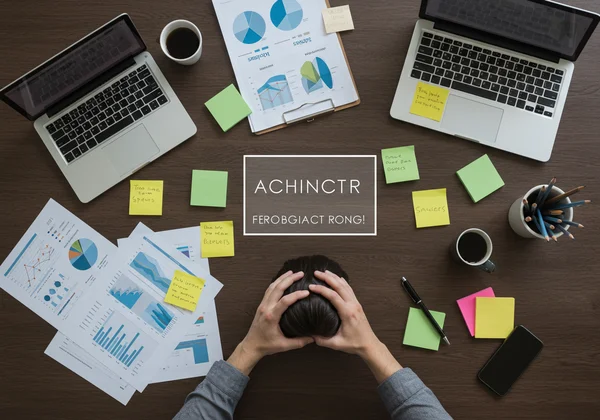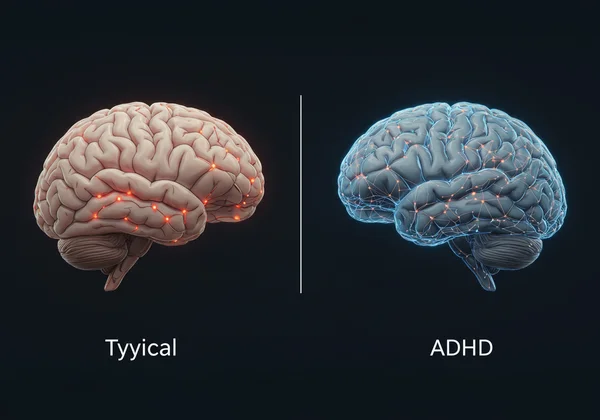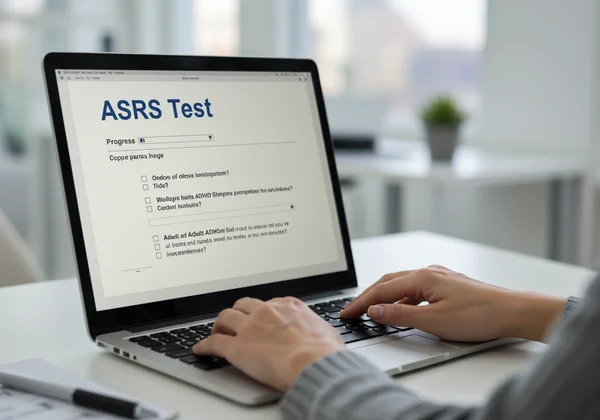ASRS Test: The Ultimate Guide to Adult ADHD Symptoms, Screening, & Strategies
October 11, 2025 | By Miles Harrison
Are you an adult who constantly feels like you're battling a tide of disorganization, forgetfulness, or an inability to focus? You might label it as carelessness or a personal failing, but what if there's a neurological reason behind it? This is the reality for millions of adults living with Attention-Deficit/Hyperactivity Disorder (ADHD). Understanding adult adhd is the first step toward clarity and empowerment. Do you ever wonder if there's a reason behind these persistent challenges?
This comprehensive guide is designed to walk you through what Adult ADHD truly is. We'll explore its often-misunderstood symptoms, introduce a reliable first step for screening (like the ASRS test), and offer actionable strategies for navigating life with greater control. Your journey to self-understanding can start right here.

What is Adult ADHD, and How Does it Differ from Childhood ADHD?
Attention-Deficit/Hyperactivity Disorder (ADHD) is a neurodevelopmental condition that affects how the brain manages attention, self-regulation, and executive functions. While it’s often associated with children, ADHD doesn't simply disappear with age. For many, the symptoms persist and evolve into adulthood, presenting in different, often more subtle, ways.
Unlike the more visible hyperactivity seen in children, adult ADHD often manifests as an internal sense of restlessness, chronic disorganization, and a constant feeling of being overwhelmed. The core challenges remain, but their expression changes with the demands of adult life, such as career, relationships, and financial management.
Defining ADHD Beyond Childhood: A Neurological Perspective
At its core, ADHD is about brain wiring, not a lack of willpower. Research points to differences in the structure and chemistry of the brain, particularly in areas responsible for executive functions—the mental skills that include planning, focusing attention, remembering instructions, and juggling multiple tasks. Key neurotransmitters like dopamine and norepinephrine, which regulate attention and reward, function differently in the ADHD brain. This neurological perspective helps us understand that ADHD is a real medical condition, not a character flaw.

Common Misconceptions About Adult ADHD
One of the biggest hurdles for adults with ADHD is overcoming common myths. Many people believe you can't have ADHD if you were a good student or if you don't "act hyper." This is false. Many bright adults develop sophisticated coping mechanisms to get by, all while struggling internally. Another misconception is that ADHD is just an excuse for being "lazy." In reality, individuals with ADHD often exert far more mental energy than their peers just to maintain a baseline of focus and organization. Recognizing these struggles is key to understanding the condition.
Recognizing Adult ADHD Symptoms: More Than Just Hyperactivity
The symptoms of adult ADHD can be grouped into three main categories. It’s important to remember that everyone experiences these issues occasionally, but for someone with ADHD, they are persistent, pervasive, and significantly impact major life areas.
Inattention and Distractibility: The Silent Struggle
This is the classic, but often invisible, side of ADHD. It’s not just about getting sidetracked by a notification on your phone. It’s a deeper struggle that includes:
- Difficulty sustaining focus on tedious or lengthy tasks (e.g., reports, meetings).
- Frequently losing items like keys, wallets, and phones.
- Appearing not to listen when spoken to directly.
- Struggling to follow instructions and finish projects.
- Chronic procrastination and poor time management.
Hyperactivity and Impulsivity in Adults: Often Internalized
While the image of a child bouncing off the walls is common, hyperactivity in adults is often more subtle. It can feel like an engine that never shuts off. Signs include:
- An internal feeling of restlessness or anxiety.
- Fidgeting, tapping feet, or doodling constantly.
- Difficulty sitting still through long meetings or movies.
- Talking excessively and interrupting others.
- Making impulsive decisions with significant consequences (e.g., spending, career changes).
Emotional Dysregulation and Executive Dysfunction
Two of the most challenging and often overlooked aspects of adult ADHD are emotional dysregulation and executive dysfunction. The former refers to intense emotional reactions, quick frustration, and difficulty calming down. The latter impacts higher-level thinking skills, making it hard to plan, prioritize tasks, and manage time effectively. These challenges are often the root cause of difficulties at work and in relationships. Gaining insight into these patterns is a powerful first step you can explore now.
The Adult ADHD Screening Process: Your First Step
If you recognize yourself in the symptoms described above, you might be wondering what to do next. The journey toward clarity often begins with a simple screening. This isn't a diagnosis, but rather a way to gather information and see if your experiences align with the known patterns of ADHD. An online adhd screening can be an invaluable first step.
Introducing the ASRS Test: A Reliable Self-Report Scale
The Adult ADHD Self-Report Scale (ASRS) is a screening questionnaire developed by the World Health Organization (WHO) and researchers from Harvard Medical School. It is a scientifically validated tool used globally to help adults identify symptoms consistent with ADHD. This self-report scale consists of 18 questions based on the diagnostic criteria from the DSM-5, making it a credible and respected starting point.
How Our ASRS Test Works: Private, Instant, and AI-Powered Insights
At our platform, we provide a confidential and user-friendly platform to complete the ASRS test. Our process is simple:

- Answer the questions: The test takes just a few minutes to complete.
- Get instant results: You’ll receive an immediate summary of your responses.
- Receive an AI-Personalized Report: Unlike basic screeners, we offer a unique, AI-driven report that provides deeper insights into your response patterns, helping you understand your unique profile of symptoms.
This process is completely private and designed to give you a clear, data-informed starting point. Take our free ASRS test to gain valuable self-knowledge today.
Beyond Screening: The Path to Professional ADHD Diagnosis
It is crucial to understand that an online screener is not a substitute for a professional adhd diagnosis. It is a tool for self-exploration and to help you decide if it's worth pursuing a formal evaluation. Think of it as collecting evidence to share with a healthcare provider.
When to Seek a Professional Evaluation
Consider seeking a professional evaluation if:
- Your screening results indicate a high likelihood of ADHD symptoms.
- Your symptoms consistently and negatively affect your work, relationships, or overall well-being.
- You are seeking validation, treatment options, or potential workplace accommodations.
What to Expect from a Comprehensive Diagnostic Assessment
A formal diagnosis is conducted by a qualified professional, such as a psychiatrist, psychologist, or neurologist. The process is thorough and typically involves a detailed clinical interview, a review of your personal and family history, and sometimes further psychological testing. Bringing your AI-powered report from our ASRS online test can be an excellent way to start the conversation with your doctor.

Living with Adult ADHD: Management Strategies & Support
An ADHD diagnosis is not a life sentence; it’s an explanation that opens the door to effective management strategies and support. With the right tools, many adults with ADHD learn to harness their unique strengths—like creativity, hyperfocus, and resilience—and thrive.
Therapeutic Approaches and Medication Options (Brief Overview)
Treatment for adult ADHD is multifaceted and should be tailored to the individual by a healthcare professional. Common approaches include Cognitive Behavioral Therapy (CBT) to build coping skills, ADHD coaching for practical strategies, and, in some cases, medication to help regulate brain chemistry. These options should always be discussed with a qualified doctor.
Practical Strategies for Daily Life, Work, and Relationships
Beyond professional treatment, many practical strategies can make a significant difference:
- Structure Your Environment: Use calendars, planners, apps to externalize your memory.
- Break Down Tasks: Large projects can be overwhelming. Break them into small, manageable steps.
- Incorporate Movement: Regular exercise can help manage restlessness and improve focus.
- Practice Mindfulness: Techniques to ground yourself can help with impulsivity and emotional regulation.
Building a Support System and Finding Your Community
You are not alone. Connecting with others who understand the ADHD experience can be incredibly validating. Find online communities, support groups, or simply talk to trusted friends and family about your journey. Sharing your experience and learning from others is a powerful part of managing ADHD.

Your Journey to Empowerment: Taking Control of Adult ADHD
Understanding adult ADHD is a journey of self-discovery. It’s about replacing self-criticism with self-compassion and recognizing that your brain simply works differently. From recognizing the symptoms to taking the first step with a reliable screening tool, you are taking control of your narrative. Knowledge is power, and the insights gained can be the key to unlocking your full potential.
Ready to take the next step? Start your journey of self-discovery today with our confidential, AI-powered ASRS test.
Frequently Asked Questions About Adult ADHD & ASRS Testing
What does the ASRS test for, specifically in adults?
The ASRS test screens for the presence and severity of symptoms related to both inattention (e.g., difficulty focusing, disorganization) and hyperactivity/impulsivity (e.g., restlessness, interrupting others) as they manifest in adulthood. It is specifically designed to capture how these core ADHD traits appear in adults' daily lives.
How accurate is the ASRS ADHD test for self-screening?
The ASRS is a highly accurate and validated screening tool developed in partnership with the World Health Organization. It has been shown to be very effective at identifying adults who may have ADHD and warrant a further clinical evaluation. However, it is a screener, not a diagnostic test.
What is considered a "positive" score on the ASRS assessment?
The ASRS Part A identifies specific responses that are highly predictive of ADHD. If you score above a certain threshold, it suggests your symptoms are consistent with an ADHD diagnosis and that a professional consultation is recommended. Our AI-powered report goes beyond a simple number to help you understand your score in greater detail.
How reliable is the ASRS test compared to a clinical diagnosis?
The ASRS is a reliable first step for screening. A formal clinical diagnosis is a much more comprehensive process conducted by a healthcare professional that includes interviews and a review of your history. The ASRS can be a powerful tool to bring to that appointment to facilitate a more productive conversation.
Is it worth getting an official ADHD diagnosis as an adult?
For many, it is incredibly worthwhile. A diagnosis can bring a profound sense of relief and validation, explaining lifelong struggles. It also opens the door to effective treatments, therapies, and accommodations that can dramatically improve your quality of life, work performance, and relationships.